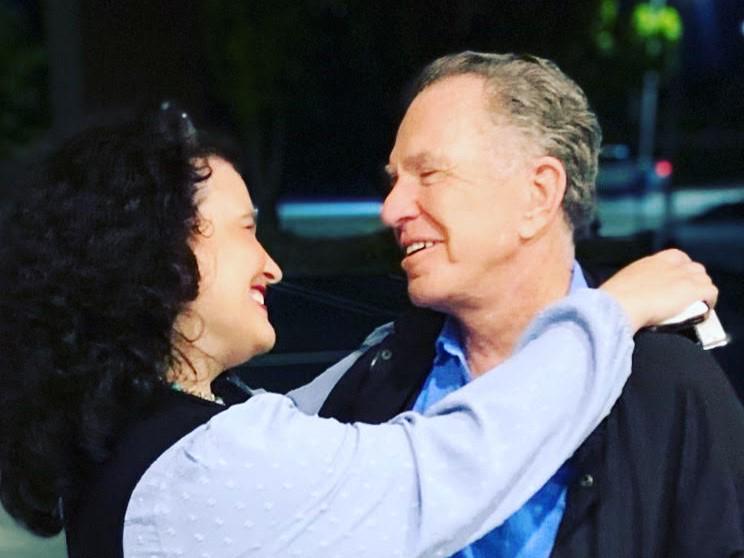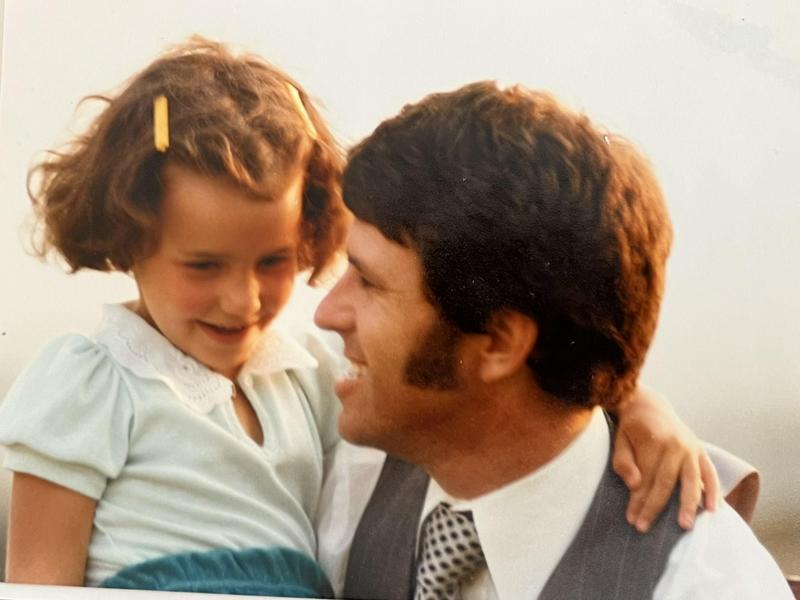Editor’s note: The new book edition of I Just Saw JESUS was released, marking 40 years since the release of the "JESUS" film (1979). The book highlights the incredible journey of Paul Eshleman, director of Jesus Film Project, to share the gospel worldwide and his dedication to creating the world’s most translated and viewed film.
China Christian Daily interviewed Jennifer Huff, Eshleman’s daughter and author of the new foreword. From a daughter’s perspective, Huff shared personal insights into her father’s remarkable ministry, unwavering faith, and the profound impact he had on her life. She currently serves as the communication coordinator for HER.BIBLE, a ministry of Cru offering an audio Bible in the New Living Translation voiced entirely by women.
China Christian Daily: Could you introduce yourself and share more about your work?
Jennifer Huff: My name is Jennifer Huff, and I am so proud to be Paul Eshleman's daughter. Growing up, I saw firsthand how his dedication to the gospel changed lives, and that definitely shaped my own journey.
I've been on staff with Cru, formerly Campus Crusade for Christ since 1998. During high school and college, I spent every summer working at Jesus Film Project. Right now I'm the communication coordinator for HER.BIBLE, a ministry within Cru, an audio Bible in the New Living Translation that is read only by women in comforting and diverse voices.
For many women, especially women recovering from human trafficking, harassment, or clergy abuse, HER.BIBLE has been a way for them to listen and connect with God's Word in a very deeply personal way. It's only in English and we are now working to expand our coaching program into as many languages as we find women producers.
China Christian Daily: In the new foreword of I Just Saw JESUS, you mentioned the parable of the lost sheep and the difficulties your family went through. Could you elaborate on how your father used this parable to address challenges within your family?
Jennifer Huff: The parable of the lost sheep was my father’s favorite parable. He embodied so much of the attributes of that good shepherd.
First of all, he never lost sight of the importance of going after every lost sheep in every tribe, in every nation and in every language. He never forgot the importance of every lost sheep, who desperately needed to be found. Even in his last days, he carried lists of groups who were uncontacted, unreached, and unengaged, asking his fellow shepherds who were going to the lost lamb in these groups.
At the same time, he showed our family what it meant to deeply care for the 99 that were still in his fold, and that included my family. My dad dropped everything to sit by my side in the hospital after a traumatic motorcycle accident that nearly took my leg. I watched him champion, pray, and seek the Lord over my godly, courageous, and wise mom through her darkest seasons, never giving hope in seeking healing for her depression.
When one of the 99 sheep in his fold was hurt or harmed, both my parents showed me what it meant to run to those bruised and hurting lambs. They were the first to get in their car and race to the home of a friend who tragically lost her husband or a friend whose teenager had run away. They modeled to us how to step into people's pain with compassion rather than withdraw from it.
My father also had a beautiful heart for other shepherds nearby. He knew that the gospel could go so much farther when people worked together instead of being divided.
His relentless pursuit of the lost sheep really shaped every part of his life at home and in ministry. It inspired my brother and me to continue to do that in our own lives in part because he cared so well for the 99 who came in.
China Christian Daily: Your father was a great servant of God, yet his family endured many sufferings. How did he cope with this with his faith?
Jennifer Huff: It was both confusing and humbling to hear him share stories of others’ answered prayers—miraculous healings, reconciliations, and people coming to faith—while our own prayers often went unanswered.
A formative experience occurred in my dad's earliest days of ministry. One of his disciplers who was on campus staff planned an elaborate outreach and brought in famous Christian athletes to speak. Then it rained and everyone assumed it was canceled and ran for cover. In the end, only a bus of 14 shy girls attended. It just wasn't what he expected. My father frantically looked at his discipler for wisdom, and asked, "What do we do?" His discipler calmly responded, "We give thanks anyways."
In the end, thanksgiving sustained and held my father and our family. A theme throughout his life was the belief that this was not the end. We may never understand why God doesn't always answer our prayers, but we can know that we're not alone in our suffering, and Jesus suffered everything for us. My dad retained this assurance that in the end, all would be well.
China Christian Daily: Could you tell us more about the vision in your father’s last days you mentioned in the foreword, of men from Liberia and Haiti, alongside a gathering of mission directors?
Jennifer Huff: It was the last day I saw him alive. The doctor believed my father was in a state of delirium, however, what I felt was something so much more holy and profound.
He was holding my hand tightly, and at one point he began reaching out to hug all these people. He said, “Oh, it's wonderful to see you all, now I'd like to share some words about faith." I said, "Who are you talking to, Dad?" He said, "While all these directors." So much of my father's life he spent in leadership, leading ministry directors, or partnering with directors. At that moment, it looked as if he was being reunited with a group of long-lost friends.
Then at one point, it seemed like he was introducing two men. He said, "In the power of the Holy Spirit, here is my brother from Liberia, and here is another from Haiti." Looking back now, I feel such peace and gratitude because that veil between heaven and earth thinned right before my eyes.
China Christian Daily: As Paul Eshleman’s daughter, how did his ministry influence your faith and life growing up?
Jennifer Huff: My father's ministry always emphasized the importance of reaching people in a way that would resonate with their lives.
One of the powerful stories I remember hearing is from when the Jesus Film Project first brought the film to Rwanda. At that time, there had been a long history of civil unrest between the two groups. The team had originally translated the film into the official language of the country, but when the film began showing, the film team quickly noticed something troubling for the oppressed group. Hearing the message of Jesus in the voices of their oppressors triggered a traumatic response in their bodies. They couldn't engage with the message. The team immediately realized they needed to translate the film into the other Rwandan language. The Impact was remarkable! When they finished, they showed it to this group of people. The film team saw a visible difference, their bodies were relaxed, and their faces softened. They were able to hear the message of Jesus. Then it was possible for reconciliation to start to happen because of the power of Jesus.
I think this story is a beautiful example of how critical it is for people to hear the gospel in a way that doesn't bring more harm to the trauma of that person but brings hope, peace, and healing. Even if you can understand the official language of your country, your heart's language matters to Jesus. That's in part why I love working for HER.BIBLE and been something that has impacted my life forever.
China Christian Daily: Are there any specific moments or testimonies from your father’s global mission that stand out to you?
Jennifer Huff: If I had to choose one story that has meant the most, it's about a father from the Middle East who came to my dad and was eager to share a video that he took of his young son during a recent festival.
In the video, his son is dancing in a courtyard. Then the boy accidentally stumbled into a nearby bonfire and was engulfed by flames. The camera falls to the ground as the father rushes to save the life of his son. The man explained to my dad that other people had thrown blankets on the little boy to extinguish the flames. Miraculously, when the fire was out, his son emerged completely unharmed. There were no burns, no singed eyebrows. He didn't even smell like smoke. The father told him to thank these people for saving his life. The little boy said they didn't save his life, it was the man who touched his face. His dad didn't know what that meant until a few weeks later, a film team arrived in his village and his family gathered secretly to watch the film in their home. As soon as Jesus appeared in the film, the little boy jumped up and said, "Dad, that's the man. That's the man who touched my face and healed me from the fire."
This story demonstrates the miraculous way that God has used the film to reach those with the least access to the gospel in places where people have to live in secrecy under oppression, without the freedom to openly hear about Jesus.












